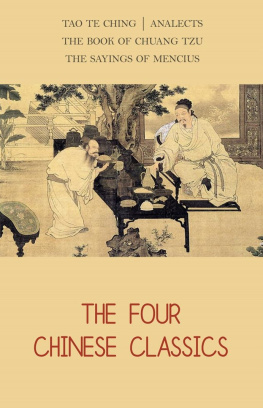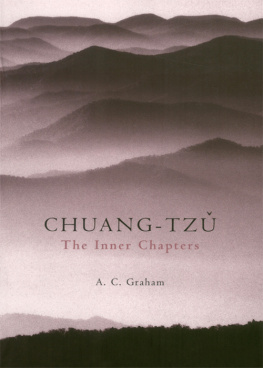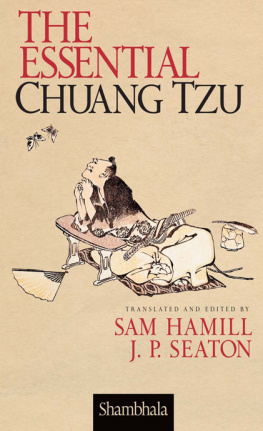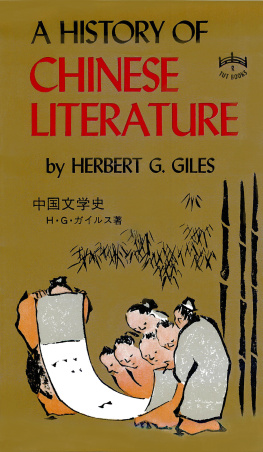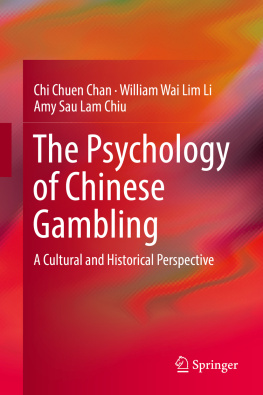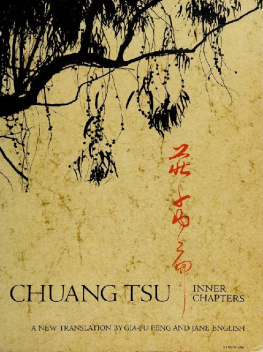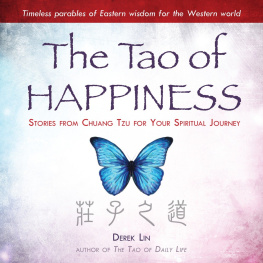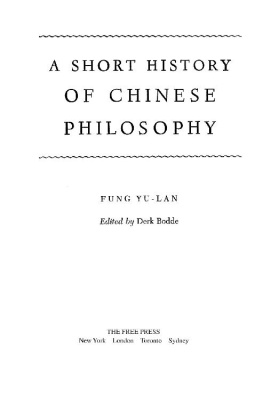Dr Yi Wu - Ch’an and Lao-Chuang
Here you can read online Dr Yi Wu - Ch’an and Lao-Chuang full text of the book (entire story) in english for free. Download pdf and epub, get meaning, cover and reviews about this ebook. year: 2012, genre: Religion. Description of the work, (preface) as well as reviews are available. Best literature library LitArk.com created for fans of good reading and offers a wide selection of genres:
Romance novel
Science fiction
Adventure
Detective
Science
History
Home and family
Prose
Art
Politics
Computer
Non-fiction
Religion
Business
Children
Humor
Choose a favorite category and find really read worthwhile books. Enjoy immersion in the world of imagination, feel the emotions of the characters or learn something new for yourself, make an fascinating discovery.

Ch’an and Lao-Chuang: summary, description and annotation
We offer to read an annotation, description, summary or preface (depends on what the author of the book "Ch’an and Lao-Chuang" wrote himself). If you haven't found the necessary information about the book — write in the comments, we will try to find it.
Ch’an and Lao-Chuang — read online for free the complete book (whole text) full work
Below is the text of the book, divided by pages. System saving the place of the last page read, allows you to conveniently read the book "Ch’an and Lao-Chuang" online for free, without having to search again every time where you left off. Put a bookmark, and you can go to the page where you finished reading at any time.
Font size:
Interval:
Bookmark:
Chan a nd Lao-Chuang
Zen and Taoists:
Lao Tzu and Chuang Tzu
Yi Wu
About the Author
Dr. Yi Wu was born in China 1939, and gained the National Ph.D. in Taiwan 1970. He was a chairman of the Department of Philosophy in the University of Chinese Culture 1970-1977. He was invited to teach in U. S.A. by the Dharm Realm Buddhist University in 1977. Since 1980 to now he has been a professor in the California Institute of Integral Studies, and teaches : The I Ching, Confucianism, Chan Budd hism, Lao Tzu and Chuang Tzu, Chinese Philosophical Terms, and The Integral Life Philosophy and Psychology. He has published 21 books in Chinese, and seven books in English such as the Commentary of Lao Tzu , The Mind of Chan , Chinese Philosophical Terms , The Principal and Virtue of the I Ching . Recently 20 years he has been interested in establishing the theory and method of the Integral Life Philosophy, and has written more than twenty papers for many conferences in Taiwan and China, and has also edited them into two book. Last year (2010) he published the Chinese book Self and MindIntegral Life Psychology .
Copyright 2011 by Yi Wu
Great Learning Publishing Company
Dr. Yi Wu
270 Allen Drive,
San Bruno, CA. 94066
All Rights Reserved
Published in the United States of America
Library of Congress Cataloging in Publication Date
Wu, Yi . 1939
Chan and Lao-Chuang
An Eternity of Endless Space
A Day of Wind and Moon
Chan Master Tien Chu
Contents
Preface
After I finished writing the book, Chan and Lao-Chuang I found that I was not a loyal believer of Chan and Lao-Chuang. Because I have been against the principle of Chan and Taoism I have talked too much.
So what makes me publish this book? There is an unchosen motivation and I cannot help but talk about it. Therefore, I prefer to accept the Chan masters stick and yell and to be criticized by the Taoist as he who speaks is not wise. It is like the Chinese story that goes, after I have painted a dragon as a snake I also add this preface as a snake with feet.
Chan originally was a Chinese production, but soon became more popular and exalted in the Western countries than in China. The Japanese scholar, D.T. Suzuki spread Chan to the United States. The Americans were infatuated by it and D.T. Suzuki became known as the Sage of the East. Some people think that the Western people have already understood the greatness of the Eastern culture. Of course this is just an optimistic idea. Behind this notion is a deep worry because the Chan, which has so deeply touched the Western people comes mainly from Japan . Ironically, when the Japanese Chan originally came from China, (during the late Sung Dynasty) Chinese Chan had already been decaying. Today, Japanese scholars are spreading an adapted version of Chan throughout the United States and it is infiltrating Western psychology.
Thats not to say that Japanese scholars have made no contributions to the Chan learning. For example, they made Chan more universal and used it to influence many parts of daily life such as flower arranging, the way of tea, Chan painting, archery, the samurai way and so on. But all of these are just an application of Chan feeling.
In the West, people loved Chan with a crazy heart. They had grown disenchanted with the promises of religion and were rebellious against their civilization of machines. Chan gave them a way to search for meaning in their lives while opposing their material society. While the Westerners used Chan to find answers, the supreme scholars used Chans power of elevating to transcend common thought for opening new developments. For example, Merton wrote The Seed of Zen Thinking, and Graham wrote The Catholicism of Zen. The supreme scholars used the Chan to purify their thought. But these kinds of outstanding people were few.
Most people only understand the surface meaning of Chan. They learn to bite by fist and to kick by feet and then it becomes a crazy Chan. Lower still are those who regard dirtiness as pureness, disorder as order, and they become like Chan hippies. Dont misunderstand the difference; even hippies arising had their different reasons but Chan learners who acted as hippies have already been criticized by many scholars.
Original Chinese Chan cannot be separated from its relationship with Confucianism and Taoism; like flowers and leaves they are offshoots from the stalk of one body. We cannot cut off the flower and wish for it to be fragrant forever. When Japanese monks grafted Chinese learning to Japan, Chinese Chan had already shown signs of decay. Fortunately, the Japanese people were not ignorant to Chinese Confucianism and Taoism, so it was still possible for Chan to bloom in a foreign land. The Americans do not have a deep foundation in Confucianism and Taoism; placing the flowers of Chan in their hands how can it flourish and purify their land? Some people do not agree with this idea. They thought that the book of Lao Tzu in the Wei Chin Dynasty became empty on pure talking because at the time, most famous scholars looked down on the social propriety. They were enjoying the happiness of fulfilling their desires. By the end of the Sung Dynasty, Chan learning only emphasized the skill of word-head and other strange methods. They did not pay much attention to the true effort of the mind and the nature. How were these Chan learners different from the modern day hippies? Both of them showed the study of Lao-Chuang and Chan going to the wrong way. If we do not work on it , it will go into the same wrong way. This is our worry.
Therefore, in this book, on one side I wish from the Lao-Chuangs influence on the Chan school to explain that Chan learning has so deep of a source in Chinese culture. On the other side, I wish after Chan and Lao-Chuang purify the Western minds then to introduce Confucianism to the Western society in order to establish deep roots for the next generation. Of course this is beyond my ability. If this small book can cause some people to become interested and continue to do great work, I will be happy even if I get the stick and yelling by a Chan master.
At last, I need to say that this book comes from a paper I wrote during my M.A. degree coursework. Early seven years, professor Nan Huei-Ching taught Chan and Taoism in the Institute of Chinese Culture . Four years later, Dr. C.H. Wu returned back from the United States and taught a Chan class in the University of Chinese Culture . I am their student. So this book contains their teachings and encouragement. Throughout this book, I offer my deep reverence to them.
Yi Wu
First print in Chinese
April 1970
Eleven th reprint 2003
Translated into English by Yi Wu
July 2008
This book, Chan and Lao-Chuang , was originally a dissertation that I wrote for my Ph.D. in Taiwan . But I published it before my oral defense, so I needed to write my second dissertation which was entitled,The Philosophy of Sincerity of the Doctrine of the Mean.
Chan and Lao-Chuang was first published in Taiwan in 1970. It was welcomed by many Buddhists and laymen alike. So far it has been reprinted more than 12 times. My American students urged me for an English version. Responding to their requests, I hand wrote this English translation. Two of my students, Ms. Catherine Montgomery Gibson and Mr. Anthony Stewart Wright helped me to edit my translation and to input it into digital format for publishing. Especially Ms. Gibson was in charge of the final editing of all notes and the form of book. Without their enthusiasm and contribution, this book would not appear before readers now. I thank them again.
Yi Wu
May 4, 2011
California Institute of Integral Studies
In the reading of Ch'an and Lao-Chuang we experience the decades-long relationship Dr. Yi Wu has enjoyed in his studies of the ancient Taoist and Ch'an Masters. So great is his understanding that it is as if Wu channels the Masters through ink to paper. Dr. Wu's writing is vivid and alive in a way that transports us to the intimate places where Masters work with their students using stories, koans, scolding and encouragement to guide them toward their full achievement. You can almost smell the damp stones and incense that permeate the monasteries where the sutras were first written.
Next pageFont size:
Interval:
Bookmark:
Similar books «Ch’an and Lao-Chuang»
Look at similar books to Ch’an and Lao-Chuang. We have selected literature similar in name and meaning in the hope of providing readers with more options to find new, interesting, not yet read works.
Discussion, reviews of the book Ch’an and Lao-Chuang and just readers' own opinions. Leave your comments, write what you think about the work, its meaning or the main characters. Specify what exactly you liked and what you didn't like, and why you think so.

